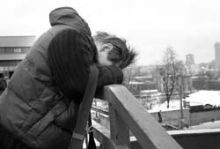February is considered the most depressing month of the year, although the season of depression lasts much longer, from fall until early spring. In fact, our contemporary life is considered a time of depression, which is determined by various social factors. The media are full of recommendations about how you can lighten your mood. Some doctors recommend long walks, others chocolate. Others urge you just to keep smiling. Most of these methods are harmless, but they won’t help if you have depression, not just a case of the blues. How does one distinguish between depression and low spirits, and why is our time regarded as the age of depression?
The statistics are disheartening. According to the World Health Organization, between 4.7 and 5.8 percent of women suffer from depression and between 2.5 and 12.3 percent of men have this disease. This means that over 110 million people in the world suffer from depression whose incidence places it third after hypertension and the flu. Furthermore, Ukrainians appear to be the most depressive people in Europe and the most depressive people in the world after Americans.
“These are the results of studies conducted by New York University in collaboration with the Ukrainian Institute of Social Studies and the Association of Psychiatrists,” says psychologist Oleksandr Hubenko, the editor in chief of Praktychna psykholohiia i sotsialna robota (Practical Psychology and Social Work). “It is generally recognized that depression is linked to socioeconomic indices in a given country. Why then are Americans in the lead? Researchers have arrived at the conclusion that depression can also be connected to the collapse of ethical and moral principles. The absence of faith and the perception of higher values also play a role.”
These factors are very present in Ukraine. We have often discussed the complicated ideological situation that has emerged in the countries of the former USSR, where destroyed moral values still have not been replaced by new ones. Arab countries appear to be the most immune to depression; with their morals and faith there is simply no time to become apathetic.
However, these are not all the socioeconomic causes of depression. There are two very important factors in Ukrainian society: the lack of correspondence between legislation and daily realities, and disillusionment with the political elite. Dr. Hubenko says: “I will give you an example of legislation’s nonconformity with life. Excessive taxes force entrepreneurs to keep a large part of their business in the shadows. Therefore, these most active members of society are forced to break the law. Naturally, awareness of one’s criminal conduct doesn’t brighten one’s mood. We still haven’t achieved rule of law. Add the absence of guarantees of maintaining property in our society, when you aren’t sure what will happen tomorrow and whether one will keep your capital-and all this against the backdrop of overall disrespect for property. This kind of situation drags a person into a chronic state of experiencing negative emotions.”
Medical factors exist on a par with social ones, yet they are the more significant factors in the emergence of this disease. “Depression is rooted in the disruption of the brain’s chemical balance,” says Natalia Zelinska, department head at Kyiv’s Municipal Psychoneurological Hospital No. 2. “Adverse life situations that traumatize the psyche reinforce these processes.”
What happens with depression? The typical signs are nervousness, feelings of guilt, a depressed mood and ability to work, apathy, lack of interest in life, fatigue, and inability to concentrate or make decisions. The disease can present itself in an entirely different way. “Depression may manifest itself as migrating pain, backache, loss of sleep and appetite,” says Zelinska. “There may be no complaints of anxiety or depressed mood. In fact, it is impossible to find two patients with absolutely the same symptoms of depression. Sometimes it is difficult to determine what kind of disease a patient has; he may consult a dozen physicians, a cardiologist, a gastroenterologist, even a surgeon. Then it turns out that he is suffering from depression. It is curable owing to new diagnostic methods and the use of highly effective antidepressants, as well as psychotherapy and therapy. It is important not only to rid the patient of depression, but also to prevent its relapse and revive his taste for life. It’s necessary to consult a physician if it’s a disease, not a bad mood. Recommendations like ‘Pull yourself together’ are absolutely irrelevant in such cases. Someone suffering from depression can’t get a grip on himself, he needs expert help. And never resort to self-treatment or try to get rid of stress with the aid of alcohol because it only worsens depression.”
It is not so easy to distinguish between the blues and depression. Someone who exhibits several of the above-mentioned symptoms should be on the lookout. “If a person is in low spirits, he should try to improve his self-appraisal,” Dr. Hubenko, says. “He should remember his moments of success, the good periods in his life, watch a comedy, read a favorite book, visit friends, associate with nice people, and find people with whom he can discuss his problem. Sports and exercise also help a lot. You can eat chocolate because it’s rich in serotonin, but not too much, because excessive weight can also cause depression. It’s very important to know how to set yourself new goals, because the cause of a bad mood can be their very absence, or even the achievement of goals set earlier. It is necessary to struggle with the lack of light, eat foods rich in protein, and drink juice with vitamins, although these must be recommended by a physician. Do good things, help someone, or feed a stray dog. Perhaps it would be worthwhile reconsidering your system of assessing the surrounding world.” If this kind of therapy does not help, you should consult a physician.







